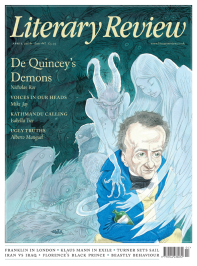Suzi Feay
Go-aan, me lad!
The Cauliflower®
By Nicola Barker
William Heinemann 328pp £16.99
Nicola Barker makes her own rules. This is a short novel by her standards but would be substantial by anyone else’s. It is also relatively conventional, being a biographical novel about an Indian sage that sticks fairly closely to the facts, despite featuring an interlude in which we observe a temple by means of a minute spy camera attached to the back of a swift – in 1855. An interpolated story about a devotee includes the sound effect parp-parp! after every mention of the guru’s name. As I say, all quite conventional for Barker.
The story of Sri Ramakrishna (parp-parp! – I’ll stop it now) is mostly told via his nephew and ardent helpmeet Hriday, who is both besotted with and bothered by his eccentric uncle. But with the voice occasionally passing from first person to third in the space of a single paragraph,

Sign Up to our newsletter
Receive free articles, highlights from the archive, news, details of prizes, and much more.@Lit_Review
Follow Literary Review on Twitter
Twitter Feed
The era of dollar dominance might be coming to an end. But if not the dollar, which currency will be the backbone of the global economic system?
@HowardJDavies weighs up the alternatives.
Howard Davies - Greenbacks Down, First Editions Up
Howard Davies: Greenbacks Down, First Editions Up - Our Dollar, Your Problem: An Insider’s View of Seven Turbulent...
literaryreview.co.uk
Johannes Gutenberg cut corners at every turn when putting together his bible. How, then, did his creation achieve such renown?
@JosephHone_ investigates.
Joseph Hone - Start the Presses!
Joseph Hone: Start the Presses! - Johannes Gutenberg: A Biography in Books by Eric Marshall White
literaryreview.co.uk
Convinced of her own brilliance, Gertrude Stein wished to be ‘as popular as Gilbert and Sullivan’ and laboured tirelessly to ensure that her celebrity would outlive her.
@sophieolive examines the real Stein.
Sophie Oliver - The Once & Future Genius
Sophie Oliver: The Once & Future Genius - Gertrude Stein: An Afterlife by Francesca Wade
literaryreview.co.uk